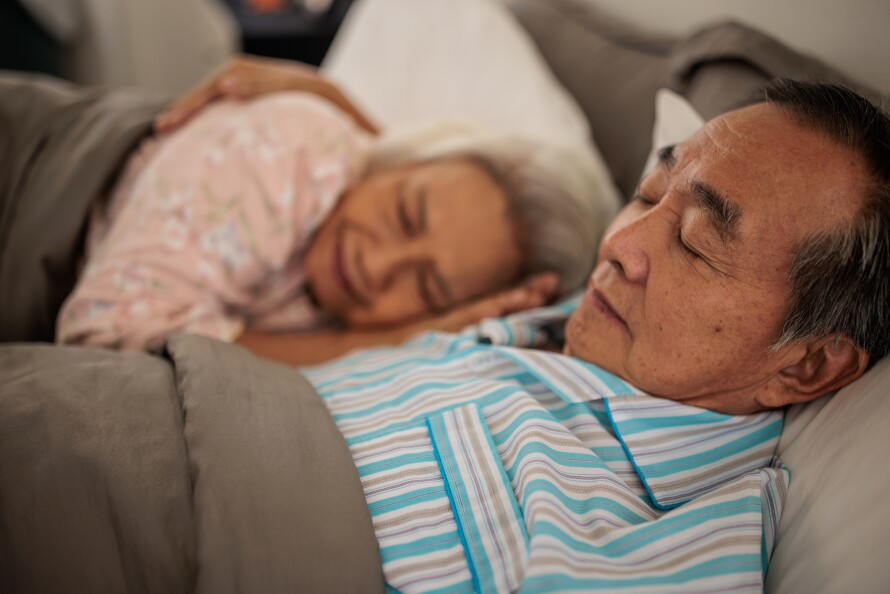
A good night’s sleep does more than refresh; it helps us heal, think clearly, and function at our best. Yet as we age, consistent, restorative sleep often becomes more challenging. Since sleep health is a vital part of aging well, improving sleep can make a noticeable difference in both physical and mental well-being for seniors
Why sleep is so important for older adults
Research has shown that sleep plays a critical role in everything from immune health to memory retention. Poor sleep has been linked to higher risks of cardiovascular disease, diabetes, depression, obesity and even cognitive decline—including dementia. Globally, more than 1 in 3 adults report insomnia and 2 out of 3 have trouble sleeping nightly.
For older adults, the stakes are even higher. Sleep patterns can change with age; even though seniors need just as much sleep as other adults, they tend to sleep lighter for a shorter amount of time and with more interruptions. Chronic health conditions and medication side effects can also reduce both the quantity and quality of sleep. In fact, insufficient sleep in seniors is associated with a greater risk of falls, accidents, and hospitalization. Mood, balance, memory, and overall quality of life can all be negatively affected.
Sleep challenges not only make seniors feel tired – they also interfere with the body’s ability to repair itself and support strong mental health. Over time, chronic sleep deprivation can lead to profound consequences, from reduced mobility to increased confusion or agitation. Certain issues tend to be more problematic and persistent for older adults:
- Insomnia is difficulty falling or staying asleep, resulting in fatigue and impaired cognitive function the next day.
- Sleep apnea refers to breathing disruptions during sleep which can reduce oxygen levels and increase the risk of heart disease and stroke.
- Restless leg syndrome creates uncomfortable sensations that interfere with falling asleep; it is a neurological condition.
- Frequent waking multiple times at night due to medications, bladder issues, or chronic pain can make staying asleep difficult.
7 ways to improve sleep in later life
Fortunately, better sleep is possible. Small changes in daily habits can lead to better rest. Dr. Brienne Miner, sleep medicine specialist at Yale, explains, “Those behaviors are what we mean when we talk about having good ‘sleep hygiene.’ They involve adhering to routines, such as going to bed at the same time every night and getting up at the same time every morning.” Here are seven evidence-based tips tailored to older adults:
1. Create a consistent sleep schedule. Going to bed and waking up at the same time every day (yes, even on weekends) helps regulate the body’s internal clock. This is especially helpful for seniors who may nap during the day or experience fragmented nighttime sleep.
2. Get natural light during the day. Exposure to sunlight, especially in the morning, helps keep natural rhythms. A walk outside or sitting by a window can promote better sleep at night.
3. Limit caffeine and alcohol. Older bodies can’t metabolize these substances as easily and both can interfere with the ability to fall and stay asleep. Seniors should avoid them after midday since they can disrupt deep sleep cycles.
4. Establish a calming bedtime routine. Activities like reading, gentle stretching, or listening to soothing music signal to the brain that it’s time to wind down. Avoiding screens in the hour before bed can also reduce melatonin disruption caused by blue light.
5. Keep the bedroom cool, quiet, and dark. Comfortable sleep environments make a big difference. Blackout curtains, white noise machines, and temperature control can improve sleep quality for those sensitive to environmental disturbances.
6. Exercise regularly earlier in the day. Physical activity improves sleep quality, mood, and energy. Aiming for moderate activity like walking or yoga can help the body feel ready to rest come nighttime.
7. Talk to a doctor about medications and sleep issues. Some medications cause sleep disturbances or daytime drowsiness. A healthcare provider can review prescriptions and suggest safer alternatives if needed.
Caregivers can support better sleep
Family caregivers and professional home care aides play a vital role in promoting sleep health. Some ways caregivers can support seniors with sleep health are:
- Helping to support a regular daily routine.
- Assisting with mobility and exercise.
- Monitoring medication timing.
- Encouraging relaxing bedtime habits.
- Providing reassurance and companionship at night if needed.
At Home Care Assistance, we understand that good sleep is the foundation of good health. Our caregivers can help older adults create and stick to routines that promote deep, restful sleep while supporting independence, safety, and well-being at home. If you’re wondering how we can support your loved one’s sleep health, we’re here to help.
###
Sources: Ageing Research Reviews; Singlecare; NIH; Sleep Medicine; Yale Medicine; Sleep Health Journal